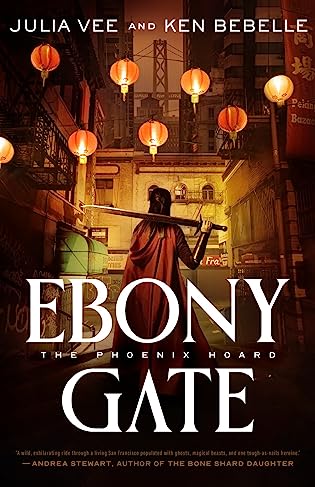 Ebony Gate (Phoenix Hoard, #1) by Julia Vee, Ken Bebelle
Ebony Gate (Phoenix Hoard, #1) by Julia Vee, Ken Bebelle Narrator: Natalie Naudus
Format: audiobook, eARC
Source: supplied by publisher via Edelweiss, supplied by publisher via NetGalley
Formats available: hardcover, ebook, audiobook
Genres: fantasy, urban fantasy
Series: Phoenix Hoard #1
Pages: 448
Length: 14 hours and 7 minutes
Published by Macmillan Audio, Tor Books on July 11, 2023
Purchasing Info: Author's Website, Publisher's Website, Amazon, Barnes & Noble, Kobo, Bookshop.org, Better World Books
Goodreads
Julia Vee and Ken Bebelle's Ebony Gate is a female John Wick story with dragon magic set in contemporary San Francisco’s Chinatown.
Emiko Soong belongs to one of the eight premier magical families of the world. But Emiko never needed any magic. Because she is the Blade of the Soong Clan. Or was. Until she’s drenched in blood in the middle of a market in China, surrounded by bodies and the scent of blood and human waste as a lethal perfume.
The Butcher of Beijing now lives a quiet life in San Francisco, importing antiques. But when a shinigami, a god of death itself, calls in a family blood debt, Emiko must recover the Ebony Gate that holds back the hungry ghosts of the Yomi underworld. Or forfeit her soul as the anchor.
What's a retired assassin to do but save the City by the Bay from an army of the dead?
My Review:
When we first drop into Emiko Soong’s life, she has been living in San Francisco for two years trying to seem normal – leaving behind as much as possible that made her hated and reviled as the Blade of Soong, the Butcher of Beijing.
But assassins don’t get to retire, and members of high-ranking Hoard Custodian families don’t get to leave their clans or their pasts behind – no matter how much they might want to. Or need to.
Emiko’s San Francisco both is and is not the one we Waīrén – read as garden-variety, no-magical-talent, original recipe-type humans see. Because Emiko is a member of one of the clans descended from the Eight Sons of the Dragon, and she has talents that seem magical. Or at least the other members of her family and the rest of the clans do. Emiko is a dud, a disappointment to her parents and her clan.
Or so she believes. (I left the book wondering a whole lot about the truth of that, but that’s me wondering and nothing revealed – at least not in this first book in the trilogy. We’ll see.)
If you haven’t guessed, Ebony Gate is urban fantasy, in a setting that’s a bit like The Nameless Restaurant where the magic and magic-users are hidden in plain sight from the mundanes, but in a world where the danger is dialed up to the max due to both political skullduggery and outright violence.
 (There are also touches (or more) of Nice Dragons Finish Last, The City We Became and Jade City if you get the same book hangover from Ebony Gate that I did and are looking for readalikes. I digress.)
(There are also touches (or more) of Nice Dragons Finish Last, The City We Became and Jade City if you get the same book hangover from Ebony Gate that I did and are looking for readalikes. I digress.)
Emiko is a woman caught between worlds, and destinies. Without power of her own, she’s been a pawn of everyone around her, from her parents to her clan to the rest of her people, the Jiārén to the primal forces at the heart of both her world and her adopted city.
At her heart she’s a protector – but she’s been molded into a killer through guilt and manipulation. San Francisco was her chance to start over, but her mother’s machinations have just pulled her back into the middle of everything she tried to set aside.
She can’t avoid the duty – because her powerful mother has put her in a position where taking up that obligation is the only way she can keep her beloved brother safe. So Emiko is back where she started, wading through blood and guts and hoping that her martial arts skills will be enough to beat back people with the power to create whirlwinds and tornadoes.
What awaits her if she fails is a fate that is, really, truly, worse than death. If she succeeds on the terms that everyone expects of ‘The Butcher of Beijing’ she might as well resign herself to an early death as her family’s vengeance blade.
But there’s a slim possibility that she can forge a path of her own – if she’s able to let go of enough of her own damage to accept a job that may still get her killed – but on her own terms and in a truly righteous cause.
Escape Rating A+: Hot damn but this was good. It had me hooked from the opening and I stayed engrossed until I turned the last page and kind of screamed because I wasn’t ready for it to be over. And it’s not as this is the first book of a trilogy but I want that second book NOW! Dammit.
Ebony Gate is one of those stories where I started in audio, and absolutely loved it, but switched to text because as much as I didn’t want this to end I was getting desperate to learn how this first book in the trilogy concluded.
 That being said, I want to give a big shoutout to the narrator, Natalie Naudus, who also narrated Max Gladstone’s Last Exit. She was a terrific choice to narrate both books, as both are written in the first-person perspective of characters with the same attitude of take no shit, take no prisoners, get shit done no matter the cost to oneself and always, always keep one’s angst and insecurities and weaknesses on the inside where no one can take advantage of the weaknesses – but no one can help carry the burden, either.
That being said, I want to give a big shoutout to the narrator, Natalie Naudus, who also narrated Max Gladstone’s Last Exit. She was a terrific choice to narrate both books, as both are written in the first-person perspective of characters with the same attitude of take no shit, take no prisoners, get shit done no matter the cost to oneself and always, always keep one’s angst and insecurities and weaknesses on the inside where no one can take advantage of the weaknesses – but no one can help carry the burden, either.
While the urban fantasy thriller pace of Ebony Gate relentlessly keeps the reader turning pages, this is a story that leans hard on the personality of its protagonist – as do pretty much all of the characters she deals with along the way.
Everyone wants a piece of her. Everyone always has. She’s second and third guessing herself at every turn, as she always has and always does, because she’s never felt like she’s enough for any of the tasks laid before her. She plows on anyway. Always.
But through her memories of her failures and her internal monologue of her thoughts, fears and frustrations, we’re able to experience her world through the eyes of someone who is an insider but who has always seen herself as being on the outside looking in. And whose fatal flaw isn’t, after all, her lack of power, but rather her inability to get her opponents to STFU. This is Emiko’s journey and we’re absolutely taking it with her and it’s fan-damn-tastic AND nail-biting every step of the way.
Before I stop the squee – and yes, I fully recognize I’m just squeeing all over the place at this point because I loved this one SO DAMN HARD – I have one more thing to add.
Ebony Gate is the first thing that has scratched even a tiny bit of the book hangover itch from Fonda Lee’s marvelous Green Bone Saga. Not that other books haven’t given me itches nearly as bad – I’m looking at you, Glass Immortals – but this is the first thing that has assuaged even the tiniest bit of that particular itch – even as it creates one of its very own. Which means I’m looking forward, rather desperately, to the next book in this series, Blood Jade, coming hopefully sometime next year

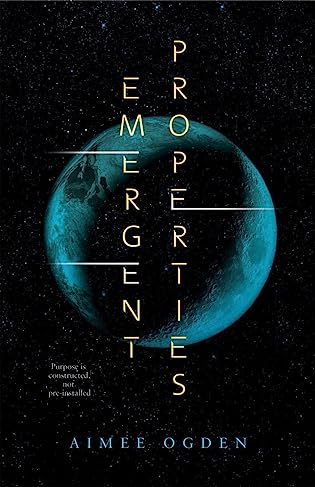 Emergent Properties by
Emergent Properties by  Montego: A Glass Immortals Novella by
Montego: A Glass Immortals Novella by 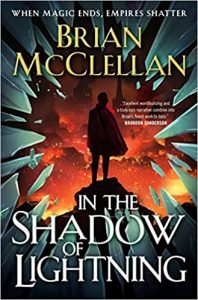 Escape Rating A: I had the oddest reaction at the end of Montego. I teared up. Not because this story ends on a sad note, because it doesn’t. It ends on a note of triumph and hope. But I wanted to cry because I know what those hopes lead to, and there’s a lot of heartbreak ahead for Demir, Montego and Kizzie. They just don’t know it yet.
Escape Rating A: I had the oddest reaction at the end of Montego. I teared up. Not because this story ends on a sad note, because it doesn’t. It ends on a note of triumph and hope. But I wanted to cry because I know what those hopes lead to, and there’s a lot of heartbreak ahead for Demir, Montego and Kizzie. They just don’t know it yet.

 Current Giveaways:
Current Giveaways: Blog Recap:
Blog Recap: Coming This Week:
Coming This Week:

















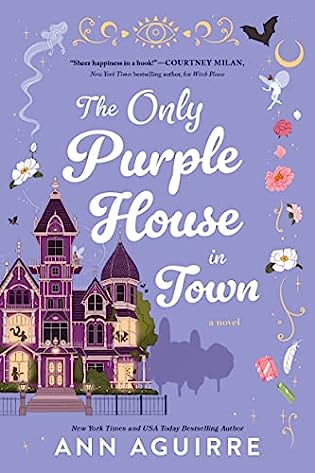 The Only Purple House in Town by
The Only Purple House in Town by 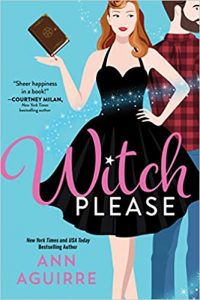 Iris Collins is at the end of her rope – and the knot she’s tied in that rope seems to be slipping through her fingers. And just at the point where all of her choices seem to range from bad to worse the universe throws her a lifeline. Ironic that, as the lifeline is the direct result of a death in her family. Her Great-Aunt Gertie has died and left her a charming but slightly dilapidated house in witch-friendly St. Claire, Illinois. All Iris has to do is get herself there, sign some papers, and she’ll have a rent-free place to live and a fresh start in a life that could seriously use one.
Iris Collins is at the end of her rope – and the knot she’s tied in that rope seems to be slipping through her fingers. And just at the point where all of her choices seem to range from bad to worse the universe throws her a lifeline. Ironic that, as the lifeline is the direct result of a death in her family. Her Great-Aunt Gertie has died and left her a charming but slightly dilapidated house in witch-friendly St. Claire, Illinois. All Iris has to do is get herself there, sign some papers, and she’ll have a rent-free place to live and a fresh start in a life that could seriously use one. Because there’s a wicked witch (even if she isn’t REALLY a witch) trying to run them out of town with an attack of flying monkeys (in the person of government bureaucracy and officialdom) who doesn’t want paranormal creatures in her perfectly normal little town.
Because there’s a wicked witch (even if she isn’t REALLY a witch) trying to run them out of town with an attack of flying monkeys (in the person of government bureaucracy and officialdom) who doesn’t want paranormal creatures in her perfectly normal little town. The story has a lot of the same cozy fantasy vibes – just with a paranormal twist – as Travis Baldree’s marvelous
The story has a lot of the same cozy fantasy vibes – just with a paranormal twist – as Travis Baldree’s marvelous  Days at the Morisaki Bookshop by
Days at the Morisaki Bookshop by  Escape Rating A-: This is simply a lovely story. It’s a bit of a combination of
Escape Rating A-: This is simply a lovely story. It’s a bit of a combination of  The Wayward Prince (The Daughter of Sherlock Holmes Mysteries, #7) by
The Wayward Prince (The Daughter of Sherlock Holmes Mysteries, #7) by  Escape Rating A-:
Escape Rating A-: 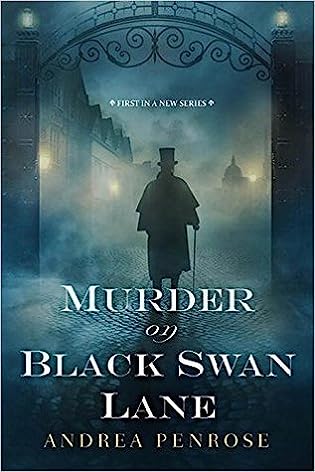 Murder on Black Swan Lane (Wrexford & Sloane, #1) by
Murder on Black Swan Lane (Wrexford & Sloane, #1) by  The Sherlockian overtones of Wrexford’s unemotional demeanor contrasted with Sloane’s carefully banked emotions as well as their opposition in gender and station gives this case much of its dramatic tension as well as providing plenty of opportunity for the characters to spark off each other so hard they very nearly set the scene afire. Not that there aren’t plenty of fires and even explosions of a slightly more mundane origin to deal with! They are clearly people who can’t be neutral about each other, even when they are on the same side. Where those sparks will lead them will undoubtedly be explored in the books to come, along with whatever else Sloane is hiding from both Wrexford and from herself.
The Sherlockian overtones of Wrexford’s unemotional demeanor contrasted with Sloane’s carefully banked emotions as well as their opposition in gender and station gives this case much of its dramatic tension as well as providing plenty of opportunity for the characters to spark off each other so hard they very nearly set the scene afire. Not that there aren’t plenty of fires and even explosions of a slightly more mundane origin to deal with! They are clearly people who can’t be neutral about each other, even when they are on the same side. Where those sparks will lead them will undoubtedly be explored in the books to come, along with whatever else Sloane is hiding from both Wrexford and from herself.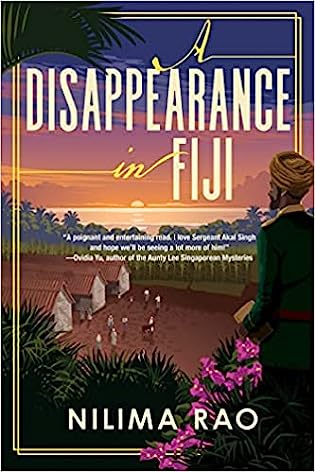 A Disappearance in Fiji by
A Disappearance in Fiji by